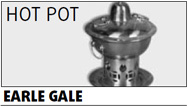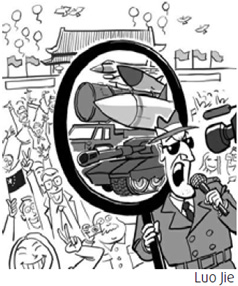China 'flexing its muscles' through dancers, singers?
By Earle Gale ( China Daily ) Updated: 2009-10-15 11:35:10I've been to a lot of parades but I've never experienced anything like the big show we just had in Beijing to mark the National Day.

One of biggest differences between the Oct 1 parade - which celebrated the passing of 60 years since the 1949 founding of New China - and the ones I have enjoyed in other cities was that this one was by invitation-only.
When I first heard it was to be staged before an invited audience, I was incredulous - and not a little disappointed.
I wanted to go. It seemed unthinkable that I would not be able to see the sights, hear the sounds and smell the smells.
But, now that the dust has settled after the passage of all of those tanks, missiles, dancers, jets, parade floats and marching bands, I have to say, the fact that I could not stand roadside did not impede my enjoyment.
I guess I came to realize that, in a country of 1.3 billion people, an occasion of national importance is always going to be a TV event.
And, along with the realization that it is possible to enjoy a TV parade came another discovery - that many of my fellow journalists around the world frankly failed to "get" it.
As the celebrations ended and the floats and soldiers marched into history books, I visited the websites I check out each day - the BBC, the CBC, several national newspapers and other online news portals - and was greeted with headlines such as "China flexes its muscles" and "Beijing gripped by military show of strength".
Stories concentrated on the tanks and missiles paraded along Chang'an Avenue, saying the parade was all about intimidating China's neighbors.
I got the sense that they were written by reporters who watched 10-second clips on their nation's TV news of tanks and missiles and thought that was all that happened.
For those who watched the entire day's activities, Oct 1 was a day-long birthday party that included a few minutes of tanks and missiles, but was also devoted to the nation's leaders dancing with performers later in the evening while fireworks exploded over the Forbidden City.

And the next day, when I spoke with Chinese friends about National Day, there was lots of talk of singers and dancers and drummers and colorful parade floats and of children releasing balloons and a good deal of national pride, but little talk of the hardware. I think most people just saw it as a good old-fashioned knees-up.
My feeling was that China, much like a Victorian greengrocer, likes to put all of its goods out front on display, but I saw that more as pride in the fact that a country which could not feed its population 70 years ago is now the world's third-largest economy.
And, if I had any doubts about what the parade meant, they would have been assuaged in the days that followed when I took the subway to Tian'anmen Square and saw what must have been hundreds of thousands of people milling around, cameras in hand, sucking on ice creams and chatting excitedly as they checked out the parade floats parked there. It was a carnival atmosphere the whole week long.
As an outsider who is learning about this country, it really seems to me that China has come a long way since 1949. It really does feel as if the Cold War mentality is long gone, existing today only in the minds of those who choose to see events like the Oct 1 birthday party as a show of strength, instead of a celebration; it would be like journalists in China choosing to see the Nov 11 parade past the Cenotaph war memorial in London as Britain rattling its sabres, instead of lamenting its dead and giving thanks for its progress.
|
|
|
|
|
|
|
|


























 Raymond Zhou:
Raymond Zhou: Pauline D Loh:
Pauline D Loh: Hot Pot
Hot Pot Eco China
Eco China China Dream
China Dream China Face
China Face






